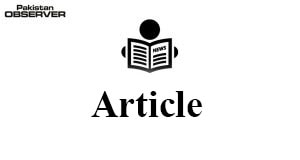Contextualising beliefs about COVID-19 in Pakistan
LIKE many other societies in the world, beliefs that contradict bio medical understanding of health and illness have a long presence in Pakistan.
Ever since HIV came to the country, it was considered a ‘punishment’ from God for their bad deeds, rather than a virus that can spread through an exchange of certain bodily fluids.
This moral view of HIV has not only contributed to stigma against people with HIV but negatively affected our efforts to reduce its spread.
In addition to this, vaccination against poliovirus is sometimes believed to be one of the ‘ways’ the West wants to or has been using to cause infertility, and thereby reduce the Muslim population.
Like other parts of the world, the COVID-19 pandemic brought with it, various beliefs opposing biomedical knowledge about the nature, transmission, prevention, and vaccination against COVID-19 in Pakistan.
From what I learned from my social interaction at an interpersonal level as well as from some published work, Pakistanis sometimes view COVID-19 as a bioweapon that China and the US may be using, in their effort to topple down each other.
On the other hand, such beliefs have been further harboured in media conversations when COVID-19 was equated with an ‘ordinary flu’ – something that has further led the general public to take the pandemic less serious.
Indeed, the country-wide lockdowns – in which businesses were permitted to operate in limited hours – has led people suspecting that why religious gatherings are under discussion when markets are open.
I have often witnessed some people wondering if due to living in less clean environments, they have developed immunity strong enough to fight the virus.
This, in combination with the belief that COVID-19 vaccines may cause ‘death’ or ‘infertility’ contributed to the vaccine hesitancy on a larger scale.
Indeed, in the previous year, few petitions were submitted to the Islamabad High Court – making a case to stop the procurement of COVID vaccines.
The petitions also claimed that COVID-19 vaccines contain microchips or “nano transducers” that control the brain or can download personal information was widely spread after Bill Gates referenced a “digital certificate of vaccine records”.
The existing limited academic research from Pakistan further indicates a strong relationship between COVID vaccines hesitancy and people’s low levels of education.The ‘anti-vaxxers’ often come up with alternatives to gain protection against COVID-19.
For instance, inhaling steam, spraying chlorine, drinking alcohol or herbal tea are often preferred over vaccination against the virus.
The widely prevalent beliefs about COVID-19 have further enabled less than promising health behaviours, as breaching social distancing measures, not wearing masks, and vaccine hesitancy have become a norm.
In my opinion, beliefs about COVID-19 are not produced in a vacuum, because how structural- and interpersonal-level forces operate in society and reinforce each other is something where the beliefs originate.
While existing health promotion campaigns largely shaped by the WHO is useful, it may continue to bring less than promising results, as COVID-19 is usually considered to be an international ‘malicious’ agenda.
There is a dire need for collaboration between powerful political, religious, media, and academic figures to educate the general public about the origins of misinformation, the importance of biomedicine and health promotion efforts, and certainly about the basis on which scientific recommendations are made.
—The writer is an Assistant Professor of health policy and system research at the Aga Khan University, Karachi.










